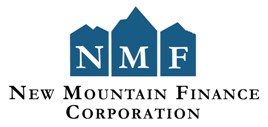|
New Mountain Finance Corporation (NMFC-NYSE) |
||
|
May 4, 2012 Issue |
||
|
The Most Powerful Name In Corporate News and Information |
||
CURRENT ISSUE | COVER ARCHIVES | INDEX | CONTACT | FINANCIALS | SERVICES | HOME PAGE |
||
|
As a Public Stock with a 9% to 10% Dividend Yield and Strong Downside Protection in Today’s Interest Environment, BDC, New Mountain Finance Corporation has an Enormously Compelling Story |
||
|
New Mountain Finance Corporation is a closed-end, non-diversified and externally managed investment company that has elected to be treated as a business development company under the Investment Company Act of 1940, as amended. The Company used all of the proceeds from its initial public offering and the proceeds from its concurrent private placement to acquire common membership units from New Mountain Finance Holdings, L.L.C. The investment objective of New Mountain Finance Holdings, L.L.C. is to generate current income and capital appreciation through the sourcing and originating of debt securities at all levels of the capital structure, including first and second lien debt, notes, bonds and mezzanine securities. In some cases, investments may also include equity interests. New Mountain Finance Holdings, L.L.C.'s investment activities are managed by its Investment Adviser, New Mountain Finance Advisers BDC, L.L.C., which is an investment adviser registered under the Investment Advisers Act of 1940. |
|
|
|
Interview conducted by: Lynn Fosse, Senior Editor, CEOCFO Magazine, Published - May 4, 2012
Mr. Weinstein: New Mountain Finance Corporation is a business development company, which is regulated by the 1940 act. The credit fund vehicle sits here at New Mountain under an umbrella of alternative assets where we have a large private equity fund platform, a public equity arm and then we have this credit strategy through New Mountain Finance. My role as the CFO at New Mountain Finance Corporation and then broadly over the entire New Mountain umbrella, is that I am the co-head of our finance and administration group.
Mr. Weinstein: We are very focused on what we call defensive growth businesses. These are businesses in industries where growth is at its back, high free cash flow businesses, usually low capital expenditures, and businesses that really have been proven to grow in both up times and downturns in the economy. We really have taken this acyclical approach since the firm was founded in 2000 and it has proven smart given the last decade where clearly we saw a ton of volatility. We want to be able to perform well in any market environment. You do that by finding the niche industries and businesses that have those strong characteristics and you focus on becoming as smart as possible in those industries. For New Mountain Finance specifically, we are focused on downsize protection. It is a credit fund, so your upside is almost always capped as you get your interest payments and then get your principal back at the end. So there, even more so, we focus on making sure that even if the equity returns in a business would not be all that exciting as we would otherwise like for our private equity portfolio, the protection of the downside needs to be strong for New Mountain Finance not protect principal. We want enough cushion in the cash flows of the business to be able to get our money back and have proper protection if something goes wrong.
Mr. Weinstein: Defensive growth, as we have interpreted it, has led us to certain industries. For example; healthcare services, specialty chemicals (not commodity chemicals where oil goes up 10% or down ten percent and the business’s earnings are up ten percent or down ten percent), but specialty chemicals where the commodity itself might only be a small component of the cost so it doesn’t really move the needle based on commodity prices. Some other industries are post secondary education, logistics, information services, software, federal services and many more other type industries. The way we like to invest in businesses is to proactively identify industry sectors. Each year we go through as a firm and do something called an industry deep dive where all the investment professionals at the firm come up with their best ideas of industry sectors to focus on. We take the employee names off the memos so it is not political and has nothing to do with if you are the most junior person or if you are a senior person. We sit around the table, we debate the merits of each of the industries, and we come up with a focus list that we are going to use and build teams around to focus on in the coming year. That has helped us identify industries. You will see many recurring themes that are coming to the forefront over and over again. They are industries we like, we may have not done a deal in those industries, or maybe we have done a deal but we still think it is a compelling industry. We build teams around the industry sectors and then we try to identify the top names in that space that are the leading players. Then we proactively try to target those businesses. For New Mountain Finance, what comes out of that is, if we do know a great business or one of the better players and we wind up not doing the equity investment on the private equity side, there may be an opportunity for the credit fund to loan to the company or other sponsor who ultimately gets the transaction. Of course, we are mindful of the potential conflicts that arise in connection with investing in different parts of the capital structure and we work diligently to make sure we have the right controls in place to address those potential conflicts and any disclosure requirements that might flow from them.
Mr. Weinstein: On the private equity side, we are helping run the business and really drive strategy and vision. We are control equity owners. On the New Mountain Finance Corporation side, we do offer management assistance, which is one of the things BDCs are required to do. We are involved in structuring conversations. We can be helpful from time to time with management teams. But the relationship with a lender of a company is clearly different than it is in equity control situations. Therefore, we are not getting involved in the day to day running of the business. We are not on the boards of the companies. We are getting information as to what is happening in the business and sometimes are able to offer guidance or things we have seen or things we know from knowing the industry very well. It is to a much lesser extent than on the private equity side. I would not even put them on the same playing field between owning control equity, which we do on our private equity side and lending in a loan context, but our analysis, underwriting and study of the business pre-investment decision making can be almost the same as an equity control investment on the PE side.
Mr. Weinstein: Since day one of the firm being founded in 2000, we have had the same exact strategy. Investing in defensive growth businesses, servicing our limited partners and investors whether it be public shareholders of New Mountain Finance today or our very first limited partners back in our first private equity fund. Controlling risk has always been one of our strongest tenants. We are much more concerned with preservation of capital, making sure there is downsize protection than we are trying to knock the ball out of the park or strikeout. We think that there is a wide spectrum of ideas and companies and businesses out there where you do have that strong upside but feel very comfortable in the capital preservation you will get from an equity side. I am also thinking about it from a debt perspective. Nothing changes, but as I pointed out earlier, capital preservation becomes even more important because you don’t share in that upside. That is what we think is so remarkable about our strategy. As we grow and as the team has grown, our due diligence has gotten more and more thorough, because we have more and more resources to execute on our strategy. But, it has not changed our investment philosophy at all.
Mr. Weinstein: We are in strong financial shape. We feel as a firm, we have continued to build out our infrastructure. We launched last year New Mountain Finance Corporation, so we have been building out since 2008 the debt credit expertise. Therefore, consistent with our public earnings reports, the financial picture is strong for New Mountain Finance, as well for the broader firm.
Mr. Weinstein: First, having someone who is intelligent in the sector is positive. I think somebody who sees that we know the industry is going to be better for them than somebody who just doesn’t understand their business at all. Two, I think people want to work with us because in many of the cases we have studied and know the very business itself incredibly well. When twenty lenders have to talk to a company and spend three weeks doing due diligence on the company to make sure that the company does what it says it does and make sure that they understand the risks, we walk in fully underwriten in our decision often times and say we know the business as we looked at it in detail. We know the industry/sector, we may know the management team. We are willing to lend and here are our terms. Or, we are part of a syndicate and somebody else is leading the deal and they tell us this is where pricing is and we come in because we can make a quick decision because we know the business already. In cases where we don’t know the business, we usually know the industry very well, so in a rapid way we can get comfortable. When you talk to just a regular lender it is very hard for them to understand the business risks and therefore if they are doing a proper diligence process it is going to take them longer than it is going to take us.
Mr. Weinstein:
New Mountain Finance has performed well since going public almost a year
ago, and did so during its prior three years of operations on the credit
side. New Mountain is an institution really focusing on controlling risk. At
New Mountain Finance Corp we are really focused on consistency, keeping our
promise which was “we are going to have a low loss ratio”, consistent
dividends, we are going to invest and lend to businesses that are businesses
we know or which are in industries that we know incredibly well. We will
have the operating team to monitor what is going on with those investments.
I think in today’s environment, as a public stock, to be able to have a 9%
to 10% dividend yield with strong downside protection in an interest
environment that we are in today, is an enormously compelling story. That is
what I would make as the case to invest in New Mountain Finance Corporation. |
||
|
I think in today’s environment, as a public stock, to be able to have a 9% to 10% dividend yield with strong downside protection in an interest environment that we are in today, is an enormously compelling story. That is what I would make as the case to invest in New Mountain Finance Corporation. - Adam B. Weinstein CPA |
||
|
|
||
|
|
||

